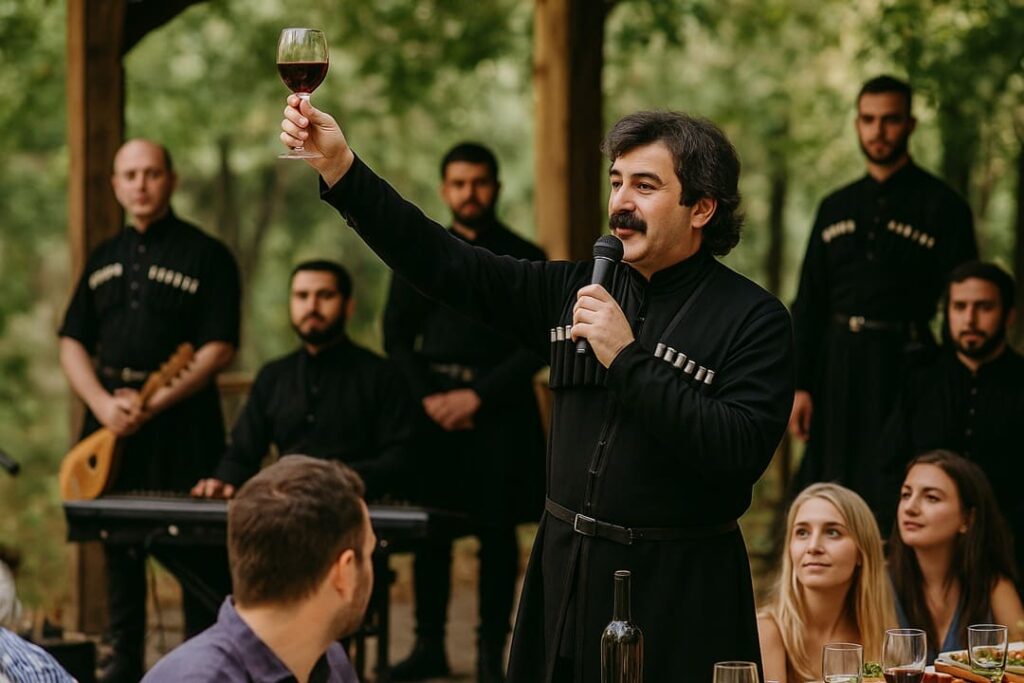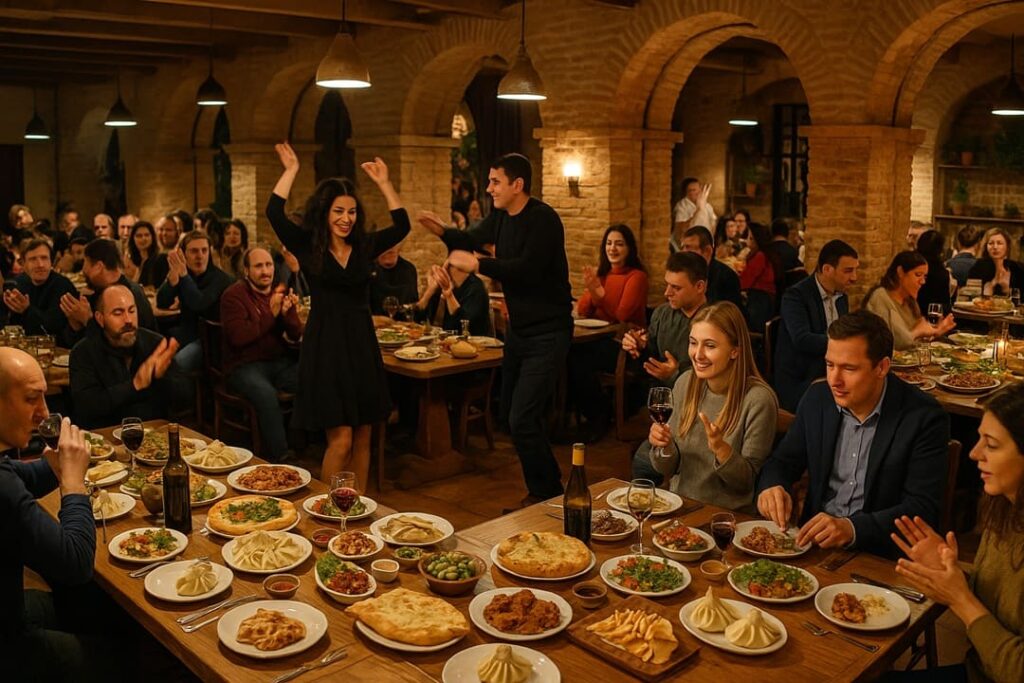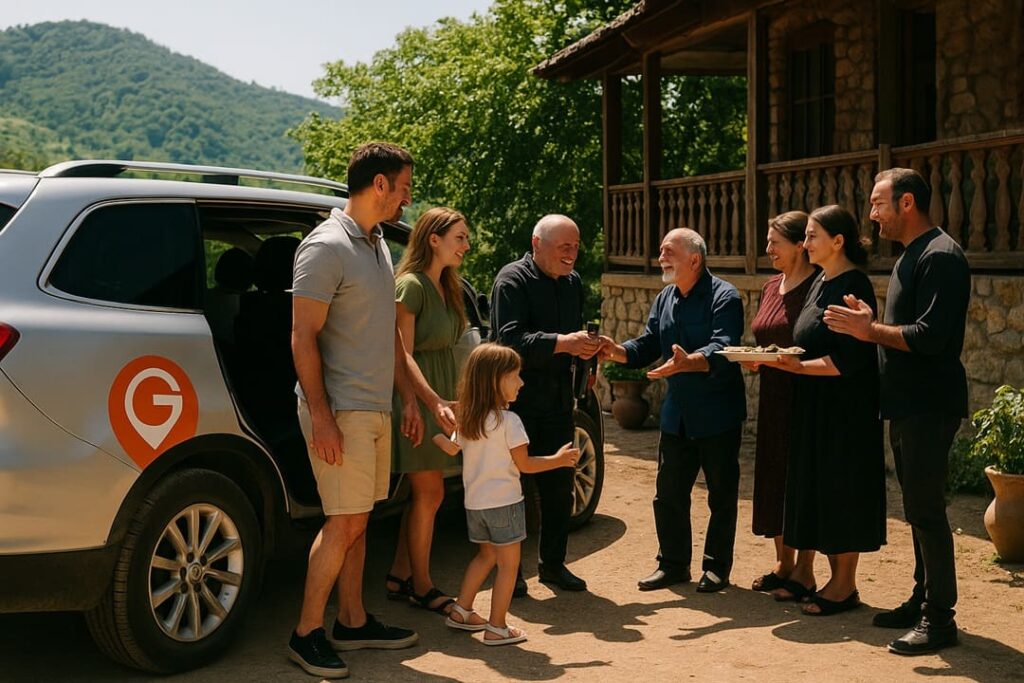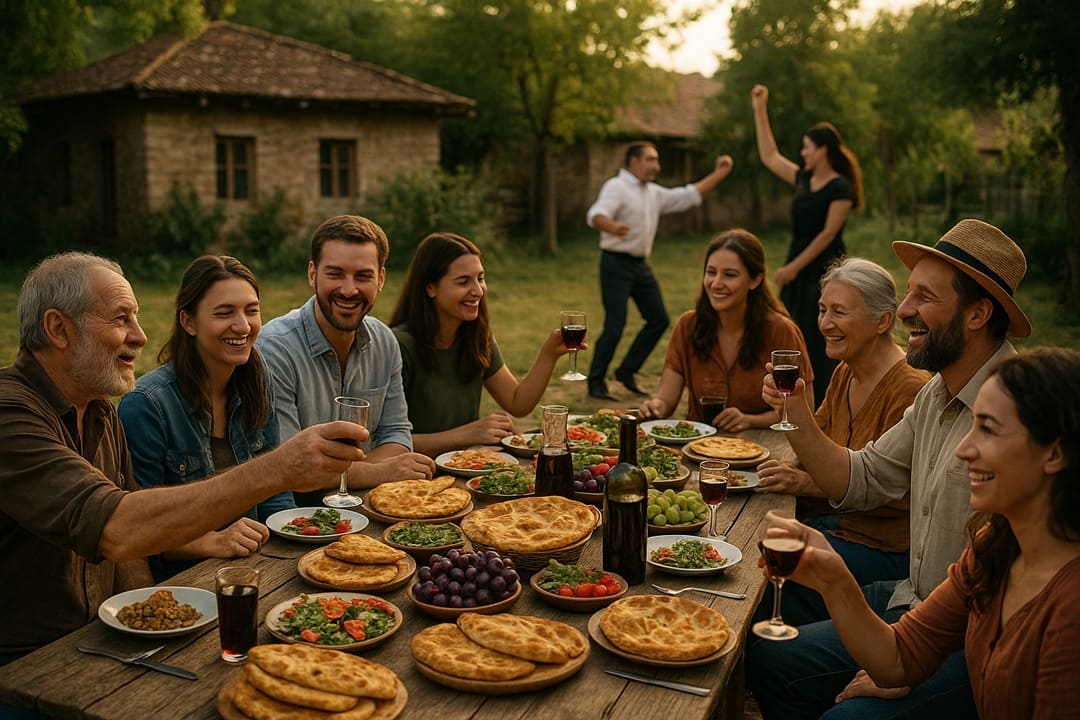A Country Where Guests Are Sent by God
There’s a saying in Georgia that sets the tone for everything else: “A guest is a gift from God.” And it’s not just a nice phrase you’ll hear in a tourist brochure — it’s how people actually live. In the mountains of Svaneti, in the vineyards of Kakheti, and on the narrow streets of old Tbilisi, you’ll feel it long before you understand it. Strangers greet you with the ease of old friends. A neighbor waves you into their yard before you even figure out where the sidewalk ends.
You don’t make dinner plans in Georgia — you become someone’s guest. And the word “guest” doesn’t mean what it means in most places. You won’t be offered a cup of coffee and sent on your way. You’ll be seated, fed, refilled, toasted, embraced, and likely sung to. You’ll be told stories in a mix of Georgian, Russian, English, or hand gestures, and you’ll leave several hours later wondering how this entire culture is so naturally warm. And the best part? No one’s doing it to impress you. It’s just who they are.
More Than a Welcome – A Full-Body Experience
In many parts of the world, hospitality is a polite exchange — a smile at the door, a drink, maybe dinner. In Georgia, hospitality is a full-body ritual. The moment someone invites you into their home — or even their roadside café — a quiet switch flips. They’re now responsible for your comfort, your hunger, and, in a way, your happiness. And they take that role seriously.
You’ll sit down thinking you’re just being offered something small. And then the dishes begin to appear: plate after plate of roasted eggplant rolls, spiced meats, tangy cheeses, fresh herbs, and warm bread that seems to arrive from nowhere. You might try to protest — “really, that’s enough” — but you’ll quickly learn that refusing more food in Georgia is like canceling a hug mid-embrace. It’s not rude — it’s just unthinkable.
The host’s pride is in your joy. Not your compliments, but the way your face lights up at the first bite of freshly baked khachapuri or a slow sip of homemade wine. And no one hurries you. Meals stretch into hours. A lunch can turn into dinner. A roadside stop can turn into a lifelong memory. That’s the rhythm here — unplanned, generous, deeply human.
The Supra – A Feast with a Soul

No matter where you go in Georgia — whether it’s a mountaintop village or a seaside town — if you’re invited to a supra, cancel your plans. The supra isn’t just dinner. It’s part ritual, part celebration, part soul-sharing session. At first glance, it’s a table overflowing with food and wine. But underneath that — it’s the heart of Georgian culture.
There’s always a tamada — the toastmaster — whose job isn’t just to raise glasses, but to raise spirits. He (and yes, it’s almost always a he) doesn’t just toast to health or happiness, but to ancestors, to peace, to mothers, to the earth. And every toast opens a little more of the room. People don’t just listen — they respond, with laughter, tears, stories of their own. And yes, there’s plenty of chacha — that firewater that burns a little but warms a lot.
You’ll pass plates of lobio (bean stew), khinkali (juicy dumplings you eat with your hands), chakapuli, satsivi, and a dozen others you can’t pronounce but can’t stop eating. And of course, wine. Georgia’s the birthplace of wine — over 8,000 years of history, with grapes still fermented in qvevri clay vessels buried underground. Whether it’s a bold Saperavi or a crisp Tsinandali, the wine isn’t just something to drink — it’s part of the dialogue. Like another guest at the table.
If you’re lucky, the supra will spill into dancing. Someone will pull out a guitar, or just start singing. Men might leap into traditional dances that feel like a cross between warrior moves and ballet. Women float with grace that’s somewhere between folklore and poetry. You won’t know the steps, but someone will pull you in anyway.
And while many travelers experience this in restaurants or guesthouses, there’s another way to get closer to the real thing: go off the path.
If you’re flying into Tbilisi or Kutaisi, consider renting a car. Public transport will get you to the big stops, but the real hospitality often lives beyond them — in smaller towns, remote vineyards, and homes you can’t find on Google Maps. A compact car is perfect for city-to-village travel, but if you’re heading into the Caucasus mountains — toward places like Mestia or Tusheti — an SUV or 4×4 is a smarter, safer choice.
Car rental services like Getmancar now operate in Georgia, and booking online is simple. You’ll have the freedom to follow invitations instead of bus timetables — and in Georgia, those invitations come often.
Dance Floors Made of Stone and Spirit
In Georgia, music doesn’t need a stage, and dancing doesn’t need a plan. One minute you’re finishing a third glass of wine, and the next, someone’s pulling the chairs back to make space. It doesn’t matter if you’re in a backyard in Telavi, a restaurant in Batumi, or a courtyard in the heart of Old Tbilisi — the rhythm finds its way into the night.

Georgian traditional dance is something you feel in your chest before you even try to follow the steps. There’s a raw beauty in the way men spin and stomp with impossible speed, almost slicing through the air with their heels. Women glide like wind over water — soft, precise, and somehow untouchable. These aren’t choreographed performances for tourists. These are inherited movements, passed down with the same reverence as family recipes.
It’s not always formal. Sometimes it starts with one person humming an old folk melody. Someone else joins in, then a clap, then a heel hitting stone. Before you know it, strangers are holding hands in a spontaneous circle dance that spills onto sidewalks or under open skies.
And you don’t need to be good. You just need to be there. Someone will show you the rhythm. Someone will hand you another drink. Someone will laugh with you when you mess up the steps. The dance is not about performance — it’s about presence.
In cities like Tbilisi and Batumi, you’ll find modern takes on this too — rooftop DJ sets that transition into traditional polyphonic singing by midnight. Jazz bars where the saxophone gives way to a guitar playing a 200-year-old folk tune. The old and the new are not in conflict here. They dance with each other, too.
It’s Not About Comfort — It’s About Connection
You might arrive in Georgia thinking you’re looking for views — mountains, vineyards, the Black Sea. But when you leave, what you’ll carry with you isn’t scenery. It’s people. Faces. The way someone pressed fruit into your hands at a roadside stand. The way your host in Signagi insisted you stay for just “one more toast,” four toasts ago. The way a stranger on the street stopped to help you find your Airbnb — and ended up walking you all the way there.
Georgian hospitality isn’t polished. It’s not about scented candles or thread-count sheets. It’s deeper than that. It’s an instinct, not a service. And it has almost nothing to do with money. You could be sitting on a plastic chair in a courtyard, drinking homemade wine from a reused soda bottle, and it’ll be one of the best nights of your life. Because it’s real. And because the person sitting across from you actually wants you there.
There’s no performative charm. Georgians don’t treat guests well because it’s expected — they do it because that’s how life has always worked here. You give what you have. You share what’s in the kitchen. You open the door.

And when it’s time to leave, it doesn’t feel like the end of a trip. It feels like saying goodbye to someone you’ve known longer than the few days you spent together. That’s the part no guidebook really prepares you for — how much Georgia stays with you. In the toast you now make a little more slowly. In the way you talk with strangers. In the way you measure richness — not in stars or stars-on-apps, but in the warmth of being invited in.
So yes — climb the mountains. Swim the Black Sea. Dance on balconies and feast in vineyards. But above all, let the people bring Georgia to life for you. Because here, hospitality isn’t something you experience. It’s something you become part of.
….and finally
No matter where you come from — whether you speak the language or not, whether you’ve been here before or just landed — Georgia welcomes you like you already belong. There’s no need for formality, no expectations for how a guest should act. The moment you step into someone’s home, vineyard, or even a quiet roadside café, you’re not a stranger anymore. You’re someone to be cared for.
That’s the beauty of Georgian hospitality — it doesn’t ask who you are, where you’re from, or what your plans are. It simply meets you with open arms. Locals may not always speak your language, but they’ll find a way to connect — through food, music, toasts, and shared moments that don’t need translation. Whether you’re from Europe, the U.S., Asia, the Middle East, or anywhere else, the feeling is the same: you are welcome here.
In a world that can sometimes feel guarded, Georgia opens its doors — wide, proudly, and without hesitation. And that’s not just something tourists appreciate. It’s something that changes you.
